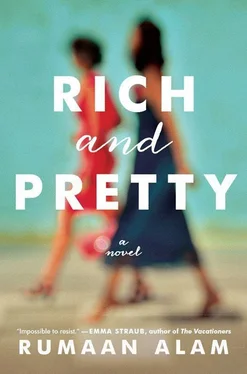Fiona has chosen a restaurant that’s not far from her office — she can only spare an hour, an actual hour, it’s that kind of office — and, when Sarah arrives, is perched on a bench in front of the restaurant. She wears a simple white button-down, but the buttons all hit in just the right place, the top one undone, so she looks like Katharine Hepburn instead of a woman trying to appear sexy. She stands, and Sarah is surprised again at how tall she is, how lovely.
Fiona somehow looks English, which she is. “Sarah,” she says. Her accent is wonderful.
“Hi!” Sarah reaches up, deposits a kiss on each cheek.
Lunch is a departure — normally, when she sees Fiona, it’s at a party. Fiona is a woman who’s reliably invited to a certain kind of party and remembers to extend that invitation to Sarah, at least a few times a year. A post — fashion show celebration for a mutual friend, also from college, now well known enough that her initials are embroidered on the tags inside asymmetrical dresses sold at Barneys; a genteel fund-raiser for an organization that plants trees in Costa Rica. Sarah relishes these invitations. Sometimes it’s fun to do something so frivolous, so glamorous, and Fiona moves through such parties with an ease that makes Sarah, too, feel at home. With Fiona, she feels like a different version of herself. She knows it’s silly, and knows it’s pretend, but she enjoys it.
There’s small talk about the men in their lives, about the rigors of work, but the clock is ticking — that hour, Fiona was clear about that hour — so Sarah broaches the subject of the wedding bands with her usual forthrightness.
No sooner are the words out of her mouth than Fiona claps, actually claps, once, twice, three times. “Of course, my God, what an honor, I can’t believe you’d ask,” she says.
“Really?” Relief. “I was worried you’d be insulted.”
“Insulted, don’t be silly.”
“Obviously, I’ll pay you, for your time, for the materials, for everything. I would just love to have something special, something unique.”
Fiona waves this away. “I know just what to do. Rose gold for you, a simple silver for Dan. Or platinum? Maybe platinum.” Fiona produces a small tape measure from her bag, wraps it around Sarah’s finger.
“I can’t tell you what this means to me,” Sarah says.
“We’re going to make you something beautiful,” Fiona says.
Because Fiona’s office is not far from her parents’ place Sarah decides to stop there. Papa’s gone but her mother is sure to be there, and there’s a lot they need to talk about, not to mention that if she hears that Sarah had lunch nearby and didn’t come over there will be a whole discussion, one that’s easier to avoid. She walks Fiona back to the office, they kiss their good-byes and say their let’s do it again soons.
Downstairs from her office is an outpost of the chain for which Fiona works. Sarah goes in, browses. The music is just the right volume, the salesgirls just the right amount of pushy. There’s a table of simple cashmere sweaters in several colors that feel like fall — burnt orange, saffron, chocolate, moss. She chooses two; they’re the perfect, simple weight, and they’re cheaper if you buy two, actually. She hates taking a big paper shopping bag. She always carries a little cotton tote, folded up into nothing, in her bag, so she takes this out and the salesgirl deposits her sweaters, wrapped in tissue paper, sealed with a sticker, into it. The bag weighs nothing because the sweaters weigh nothing.
It’s warm now but she can tell it won’t be all day, that in a couple of hours, wherever she is, probably walking back to the apartment, she’ll be glad she has the blazer on. At the moment, though, she feels damp. She’s heard about people injecting something into the armpits, that this can control your perspiration. Her legs are a bit sore from the morning’s class. She doesn’t get to class as often as she means to. She’s a little out of practice.
Sarah walks east. The sun is bright. She worries her sunglasses might be leaving a tan line on her face. In only a few weeks, though, she’ll be yearning for the sun. She hates the winter. She’s been thinking of a getaway before the wedding, her and some friends — Amina, Fiona, Meredith, Lauren, of course. Florida, Mexico, maybe even into the Bahamas, somewhere that’s the right blend of tacky (tropical drinks in comically sized glasses, dance contests) and luxurious (a proper restaurant, somewhere to get a massage). She meant to mention this to Lauren last night, had thought Lauren might actually know just the right destination. She reads a lot of magazines. They had not, in the end, talked about the wedding as much as she’d hoped to. Their conversations lately do not seem to go the way that she imagines they will go.
Lauren, whom she has always known and understood so well, suddenly seems a mystery. Things change, in life — of course they do. People grow up, become interested in new things, new people. Our way of being in the world is probably a lot less fixed than most people think. But Lauren is a part of her world, and she’s a part of Lauren’s. She knows this. The circumstances have changed over the years, of course — but that fact has remained. They’ve fought. They’ve grown apart. Those first few years, after living as roommates, it had been Lauren who wanted a place of her own and seemed to begrudge every dinner invitation (there was always some guy). Then, there had been Gabe, whom Lauren had put at the very center of her life. Sarah had been jealous, but that had passed. She continues to tender the invitations, to make the telephone calls, and Lauren continues to answer them. They have a good time together, and they need each other.
She worries that on some level Lauren is jealous, and there is no way to ask her that, no way to suggest the possibility, nor is there anything that Sarah can do to undo it if that is the case. Thinking of Lauren makes her think of being a kid. It is a wonderful thing, to have a friend who knew you as a kid. It is the closest of course that she has to a sibling, a thought she doesn’t like to spend too much time on, because it reminds her that she had one, a sibling, once, a long time ago, but he is dead.
She’d have to get over it, or through it, somehow. She’ll buy Lauren a gift, or take her out for another dinner, and reassure her that the wedding is going to be cool, is going to be their thing, not Lulu’s thing. Not white dresses and ornate flower arrangements, not guys in tuxedos and a string quartet. She hates that kind of wedding. She wants to have fun, and good food, and people she likes around her, and she wants them all to be happy. She knows that she can make Lauren understand this, and she knows that Lauren can help her make the wedding this way. It’s important, it’s imperative, really, because the only way to get Lulu to realize it’s not her party is to show her that it’s theirs.
Sarah is excited to get married and annoyed that it seems that Lauren is embarrassed by her excitement about this. She feels embarrassed herself, like someone has caught her wearing something out of fashion, like she’s admitted to liking a movie everyone hates. She thought this was what people wanted: a happy ending. Do people not want happy endings after all?
Lauren would be better off with a man. It sounds a stupidly unfeminist thing to say, but it’s what she thinks, not because she thinks a woman needs a man to be happy, not because she thinks a person who is single can’t be as happy as a person in a romantic relationship, but because she knows Lauren. She’s known her since she was a kid, she’s known her with boyfriends and without boyfriends and she knows which is the better Lauren. She knew her with Gabe, and the Lauren with Gabe was the best Lauren she’s known in the twenty years she’s known her. The Lauren with Gabe smiled, and laughed, and was never in any hurry, and always seemed so satisfied to be doing whatever she was doing. The Lauren with Gabe was a beat slower, almost like she was stoned — perhaps she was stoned, come to think of it. But he had a way of looking at her and Lauren had a way of being looked at by him: Sarah liked it. She liked him. Lauren pretends now that the whole thing meant less than it did, but Sarah is not fooled by this. She wants Lauren to be happy, and she wants her to be happy for her. She wants them to be happy at the same time.
Читать дальше












